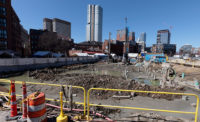Boston will become the first major city in the country to incorporate Obama-era, federal anti-discrimination rules into the process of reviewing major new apartment and condo projects.
The Boston Planning & Development Agency (BPDA) on Dec. 17 voted to add Affirmatively Furthering Fair Housing rules to the city’s zoning code, a move that comes amid an ongoing surge of large, new residential projects not just downtown, but increasingly in the city’s working-class and minority neighborhoods.
The Obama-era rules became a favorite target of President Donald Trump on the campaign trail, who rescinded the policy over the summer, arguing they would lead to flood of “low-income housing” into the suburbs.
However, the new policy has the solid backing a major trade group representing developers in Boston and across Massachusetts.
Tamara Small, CEO of NAIOP Massachusetts, said the developers in her organization recognize the need for the rules, having formed a group to provide feedback on the proposal to the elected officials working on it.
“It was a collaborative process,” Small said. “We really want to tackle decades of systemic discrimination in housing. Our members are very focused on creating housing opportunities.”
“It is really important to recognize that the real estate industry of today is not the real estate industry of the 1950’s,” Small said.
The organization’s main concern was that the rules and the vetting process be predictable and clearly laid out, as well as having enough flexibility to enable developers to come with creative ways of fulfilling their obligations.
“We also weighed in to ensure there is a process that is both predictable and clear to understand,” Small said.
Under the new requirements, housing developers will use an online tool created by BPDA officials to submit a range of information called for under the new policy, starting with the proposed site of the project and the neighborhood it would be built in.
Developers would also be required to examine the potential for gentrification and other potentially negative impacts on “area residents historically discriminated against,” the development authority noted in a press release.
To head off or mitigate any potential negative impacts, developers would be able to pick from a number of options laid out by the city under the new review process.
These include boosting the number of affordable units available for rent or purchase at below market rates in the proposed project, or further deepening the affordability.
Other options include providing more two-bedroom affordable units large enough for families, or ensuring the number of family-sized, affordable units in the proposed project matches up with the percent of these larger apartments and condos in the neighborhood.
Developers also have the flexibility to propose alternative steps as well to address potential neighborhood displacement and affordability issues, Small said.
“They will have flexibility to come up with creative solutions that might be better suited for that project and for that neighborhood,” Small said.
The proposal was championed by City Councilor Lydia Edwards, with the council voting on Dec. 9 to unanimously approve it.
The last and final stop will come before the Boston Zoning Commission, which is expected to approve the amendment to the city’s zoning rules early next year.
“To reverse the exclusionary housing practices of the past that have kept families of color from accessing safe and secure housing and building generational wealth, we must support aggressive new housing policies that promote equity and fairness,” said Boston Mayor Marty Walsh said in a statement.






Post a comment to this article
Report Abusive Comment